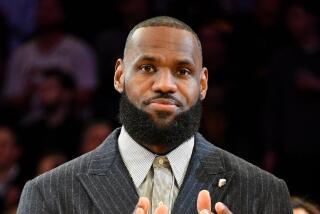The Man Who Made Reebok Jump High
CANTON, Mass. — Paul Fireman’s two-decade career with Reebok International Ltd., which agreed this month to be acquired by Adidas-Salomon for $3.8 billion began at an industry trade show in Chicago 26 years ago.
Fireman spotted an impressive display of running shoes by Reebok, an obscure British brand bearing the name of an African gazelle. Fireman, then 35 and coming off some setbacks in the sporting goods business, bought U.S. distribution rights to the shoes for $65,000.
With the industry then cornered by the likes of Nike and Converse, Fireman’s expectations were modest.
“My goal was to have a respectable, small, quality company where I could get my two or three weeks of vacation a year, and pay to send my kids to school,” Fireman recalled in an interview at Reebok’s headquarters.
He ended up with much more. Fireman parlayed his work ethic -- and a street-level approach to marketing research -- to turn Reebok into the No. 3 industry player, behind Nike and Adidas, and to elevate athletics apparel into high fashion.
With a wife and three kids, Fireman wasn’t content just to pitch the shoes at trade show booths -- he filled the trunk of his car with Reeboks and traveled from race to race, trying to turn runners on to shoes that at $60 a pair were then the most expensive in their market niche.
Now, with Germany-based Adidas buying Reebok to better position itself against industry leader Nike, Fireman emphasizes the growth prospects from combining companies with complementary strengths. He also stresses Adidas’ assurances that the Reebok name will remain and its 9,100-person workforce will largely stay intact.
But the 61-year-old acknowledges reluctance to sell the company he has presided over.
“There are emotional things that go on in your mind,” Fireman said with his Adidas counterpart, Herbert Hainer, at his side after a news conference a week after the transaction was announced Aug. 3. “Right now, I’m not leaving much space for that.”
Fireman’s longtime friend, Bob Epstein, suggested the deal was more wrenching than Fireman acknowledged.
“I think part of Paul’s soul will go when the company is sold, because he gave it breath, and life,” Epstein said. “It will be very difficult for him to walk away.”
Fireman, Reebok’s chief executive and chairman since he bought out the British parent company in 1984, expects to continue leading Reebok at least through the completion of the acquisition by Adidas early next year.
It’s a far cry from Fireman’s early days. He grew up in the working-class eastern Massachusetts city of Brockton and attended Boston University but did not graduate.
Fireman worked at a family-owned sporting goods distributorship, but the business eventually folded. Among the ventures Fireman later tried was a camping novelty called Great Balls of Fire -- fire starters shaped like golf balls.
After Fireman bought Reebok’s U.S. distribution rights in 1979, the brand took off when aerobics became popular in California in the early 1980s. Fireman offered specialized aerobics shoes in 1982 that were a hit with women who liked the shoes’ light weight, comfort and understated style.
“It was really that insight that propelled the company through a period of very rapid growth,” said John Quelch, a Harvard Business School professor who served 12 years on Reebok’s board beginning in 1985, when the company made its initial public stock offering.
Reebok expanded into basketball and football, pushing aside brands such as Converse, which was bought by Nike in 2003. Reebok’s sales grew from $13 million in 1982 to $1.8 billion in 1988 and $3.8 billion last year.
Reebok has recently emphasized endorsement deals with hip-hop musicians in an effort to attract young buyers who view sneakers as high fashion.
Fireman’s attention to consumer demand for fashionable athletic wear was key to the company’s success, Quelch said. “He spent a lot of time visiting high schools, and giving talks in school gyms, and using that for his own personal market research,” Quelch said. “He would look out into the audience and see what kids were wearing ... whether the laces were tied or not tied, and how long their shorts were.”
“We never waded through reams and reams of market data,” said Andrew Rohm, a former Reebok marketing employee and now a business professor at Northeastern University. “He was willing to push his ideas based on intuition.”
As the company grew, Fireman periodically stepped aside from day-to-day management, focusing on real estate projects. His longest such period, lasting 12 years, ended in 1999 after Reebok began faltering. He underwent quadruple-bypass surgery before his most recent return to day-to-day management in 2004.
Fireman, whose wealth was estimated by Forbes magazine in March at $1 billion, is the biggest beneficiary in the Adidas-Reebok deal. He and his wife Phyllis -- who does not work for Reebok -- collectively own 17% of Reebok’s shares, which would rise in value from about $598 million to $803 million if the deal receives regulatory and shareholder clearances. That’s because the price Adidas is paying Reebok stockholders is $59 a share, 34% more than Reebok shares closed at the day before the acquisition was announced.
Fireman said that he didn’t “need any more money” and that he hoped for more time to work on ventures like his development of a Jersey City, N.J., golf course on a former toxic waste dump site, a project led by his son, Dan.
“I don’t expect to retire,” Paul Fireman said. “I’m not good at sitting in a rocker. I’ll always be doing something.”
More to Read
Inside the business of entertainment
The Wide Shot brings you news, analysis and insights on everything from streaming wars to production — and what it all means for the future.
You may occasionally receive promotional content from the Los Angeles Times.










